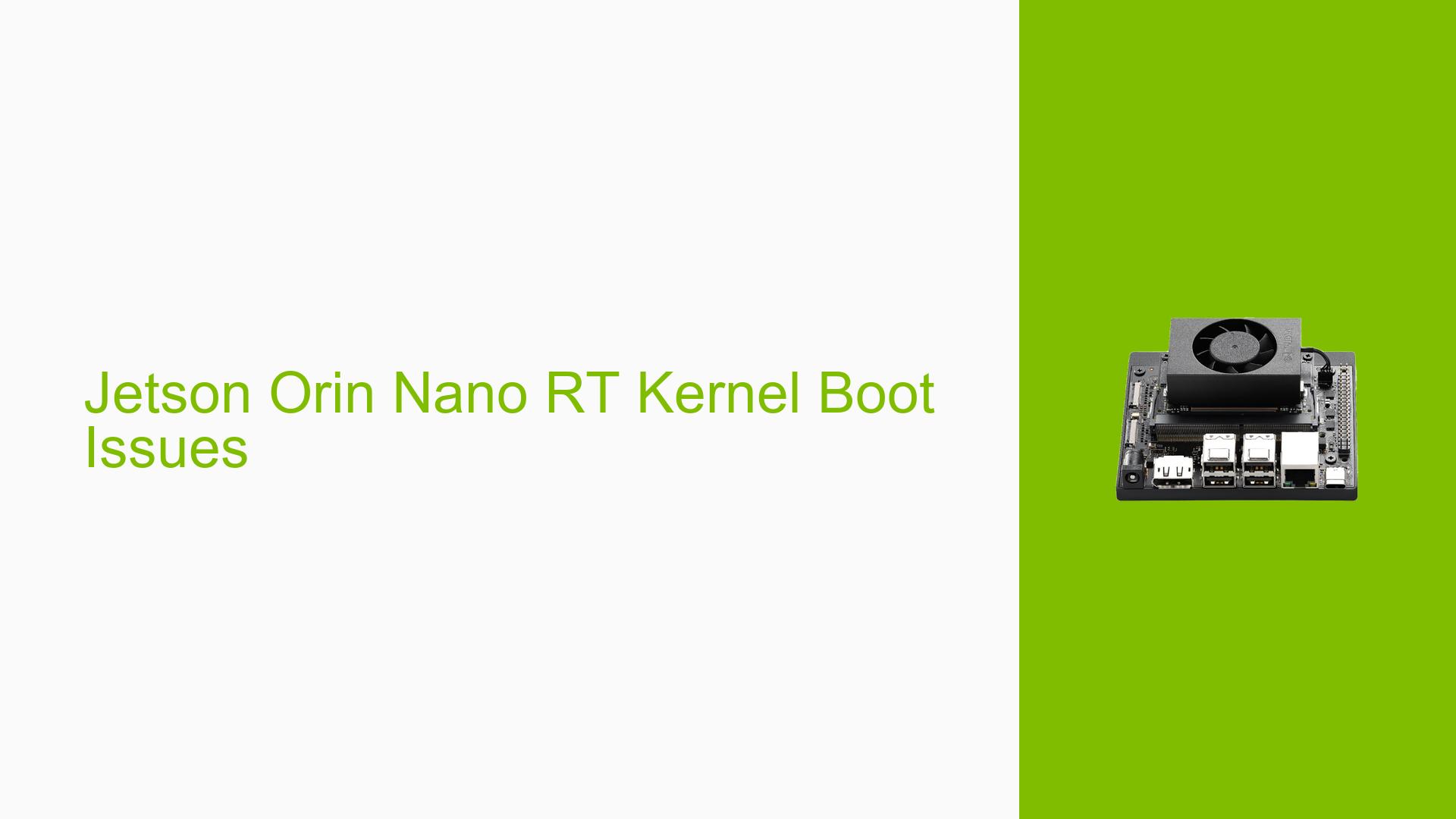Jetson Orin Nano RT Kernel Boot Issues
Issue Overview
Users are experiencing difficulties booting the Nvidia Jetson Orin Nano development board with a custom-built RT (Real-Time) kernel. The main symptoms include:
- The board fails to boot after flashing a custom RT kernel
- In some cases, the board gets stuck at a black screen with a flashing cursor
- The issue occurs specifically with RT-enabled kernels, while non-RT kernels boot normally
- The problem affects both JetPack 6.0 Developer Preview (DP) and JetPack 5.1.3 versions
These boot issues significantly impact the usability of the Jetson Orin Nano for real-time applications, preventing users from leveraging the RT capabilities of the system.
Possible Causes
-
Kernel-initrd mismatch: The NVMe drivers in the initrd (initial RAM disk) do not match the custom RT kernel, causing boot failures.
-
Incorrect flashing procedure: Users may be using incorrect commands or methods to flash the custom kernel onto the device.
-
JetPack version incompatibility: Some issues may be specific to certain JetPack versions, particularly the Developer Preview releases.
-
Incomplete kernel customization process: Users might be missing crucial steps in the kernel customization and signing process.
-
Hardware-specific issues: Some problems may be related to the specific hardware configuration of the Jetson Orin Nano.
-
Host system compatibility: The Ubuntu version on the host machine (e.g., Ubuntu 22.04) may affect the ability to use certain tools like SDK Manager.
Troubleshooting Steps, Solutions & Fixes
-
Use the correct JetPack version:
- For stability, use JetPack 5.1.3 instead of 6.0 DP.
- Download packages from: https://developer.nvidia.com/embedded/jetson-linux-r3550
- Follow the Quick Start guide to extract and flash the image.
-
Update initrd to match the RT kernel:
- Unpack the initrd following this guide: https://docs.nvidia.com/jetson/archives/r36.2/DeveloperGuide/SD/FlashingSupport.html#modifying-the-ram-disk
- Replace
/lib/modules/($uname -r)/in the unpacked folder with your RT kernel modules (e.g., replace 5.15.122-tegra with 5.15.122-rt-tegra). - Update both
rootfs/boot/initrdandbootloader/l4t_initrd.img. - Repack the initrd and flash again.
-
Use the correct flashing command:
sudo ./tools/kernel_flash/l4t_initrd_flash.sh --external-device nvme0n1p1 -c tools/kernel_flash/flash_l4t_external.xml -p "-c bootloader/generic/cfg/flash_t234_qspi.xml" --showlogs --network usb0 jetson-orin-nano-devkit internal -
Set up a serial debug console:
- Follow the guide at: https://www.jetsonhacks.com/2019/04/19/jetson-nano-serial-console/
- Use the serial console to diagnose boot issues and execute commands during early boot stages.
-
Fix black screen issue (for Orin):
- After flashing, connect to the serial console.
- Log in and execute:
sudo depmod -a - Reboot the system.
-
If using Ubuntu 22.04 on the host machine:
- Download individual packages instead of using SDK Manager.
- Follow the manual flashing procedure in the Quick Start guide.
-
For persistent issues:
- Dump the serial console log for further analysis.
- Share the log with Nvidia support or on the developer forums for expert assistance.
-
Wait for official RT kernel support:
- Nvidia plans to provide pre-built RT kernels on their APT server in future releases.
- This will eliminate the need for manual kernel building and simplify the process.
-
Consider using non-RT kernel temporarily:
- If RT features are not immediately critical, use the standard kernel until official RT support is available.
-
Stay updated:
- Regularly check the Nvidia Developer forums and documentation for updates on RT kernel support and known issues.
- Be prepared to update to newer JetPack versions as they become available, which may resolve some of the current issues.
